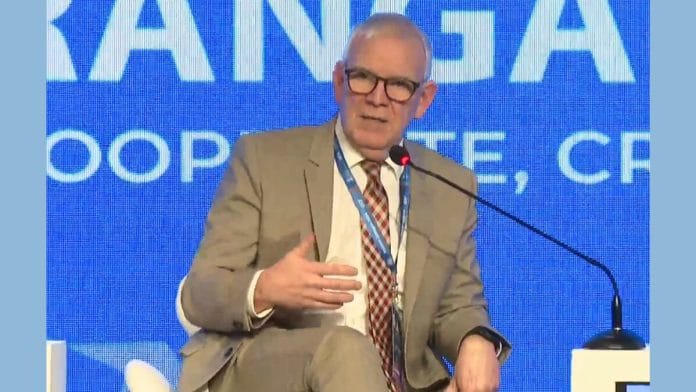New Delhi: India and Germany are looking to boost private investment in the renewable energy sector, and will soon host a joint conference to make it possible, it was announced at the ongoing Raisina Dialogue.
Jochen Flasbarth, the state secretary of Germany’s economic cooperation ministry, said that investors should know about the markets to invest in.
“I had a meeting with the Ministry of New and Renewable Energy, and we plan to host a joint conference to showcase the huge business opportunity in India and increase renewable energy investment,” he said Thursday during the plenary session titled, People, Planet, and Prosperity: Invest, Finance and Grow.
The session, held during the second day of India’s premier conference on geopolitics and geoeconomics, was moderated by Organisation for Economic Co-operation and Development (OECD) analyst Geraldine Ang and featured discussions on climate change mitigation and adaptation funding, private finance in the sector, and the need to “urgently invest in the Global South to meet the goals of the Paris Agreement”.
The discussion began with the acknowledgment that emerging markets and developing economies (EMDEs) needed $2 trillion annually by 2030 to be able to meet net-zero carbon emissions. This need, panellists agreed, could not be fulfilled by public sector investment alone.
V. Anantha Nageswaran, India’s Chief Economic Advisor, started the discussion by outlining how private capital at the moment, isn’t ready to embrace the risks or the opportunities that come with funding energy transition.
He brought up the Sustainable Finance report, published during India’s G20 presidency in 2023, and said it was time to follow through on the recommendations made in it. “…financiers and developed countries, also need to remember the principle of common but differentiated responsibilities that underlies the Paris Agreement,” Nageswaran added.
Flasbarth emphasised that while the developed countries’ goal of $100 billion in climate finance was met in 2023, its purpose was to mainly work on credibility. “We all know $100 billion, or even doubling it won’t be enough for climate change, but credibility is the best currency in the international market right now, and we established that with our goal,” he said.
The German official further said that the renewable energy sector should be moved away from the Official Development Assistance – money from rich countries – and should head towards private investment.
Challenges of private finance
The latter half of the session focused on ways to “de-risk” climate change investment to mobilise more private finance to “transition away” from fossil fuels, as agreed at COP28 in Dubai.
World Bank Managing Director Anna Bjerde spoke about the need for a stable policy and regulatory framework to attract private investors. “Look at India, for example. They have a clear target of 500 GW of renewable energy capacity by 2030, and are well on their way to fulfil it,” she said, highlighting actions that other countries could take to follow suit.
Sumant Sinha, the CEO of ReNew India, spoke about the constraints India faces in achieving its massive renewable energy targets. Some of them were finding the execution capacities for installing renewable energy equipment, and lack of financing, he added.
“We mainly rely on debt financing, but it is entirely commercial,” said Sinha. “No one is willing to take a cut on returns, even though we’re doing the right thing for the world as a whole.”
The panel also spoke about how the international financial architecture can be transformed to increase financing in everything from biofuels to green hydrogen, thereby moving away from a “business-as-usual” mentality. “Should we be using the international institutions that were constituted for development to now tackle climate change? Or, should we develop new climate change-centric lending institutions?” Sinha asked.
(Edited by Tikli Basu)






